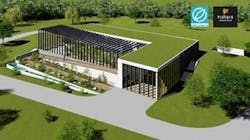VIDEO: Botanical wastewater treatment ‘garden’ to be delivered in Russia
MOSCOW, Russia – Hungarian company Organica Water has partnered with Dutch engineering firm Nijhuis Industries to deliver a botanic garden wastewater treatment plant (WWTP) in Russia.
The 1,000 m3/day project will treat the wastewater from a high-profile shopping center in Russia. Below you can see a video showing an artist’s impression of the facility:
Called a ‘botanical wastewater treatment plant’, the project is situated in a glass house with the aim of integrating a treatment facility in the urban area within the shopping center complex.
Organica’s previous largest installation was an 80,000 m3/day plant in South-Pest, Hungary and has previously installed a 40,000 m3/day project serving 200,000 people in Shanghai, China.
For the Russian installation, Nijhuis will use its pre-treatment solution including screening and Dissolved Air Flotation (DAF) units to remove the large particles from the wastewater prior to entering the Organica Food Chain Reactor (FCR).
After the secondary treatment through the FCR, CarboPure (CP) and UV disinfection units (NUV) will polish the effluent to the stringent Russian discharge requirements. Excess sludge will be treated with a Drum Filter (NDF) and Screw Press (NSP).
Nijhuis said: “Generally, when people think of wastewater treatment, they envision large concrete buildings located far from population centers, and big open basins emitting foul odors. The botanical garden flips this idea upside-down, offering customers a compact, odorless, garden-like facility which produces a high-quality, reusable, effluent. The attractive look and feel of the botanical garden solution further enhances this, as the facility can be used not just as a WWTP but also a scientific, educational, and recreational space for the community.”
###
Read more
Nijhuis wins big in Egypt to deliver self-sufficient industrial wastewater plant
Taking Hungary’s reclamation gardens east
